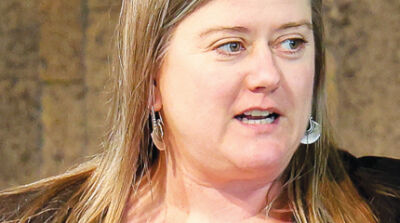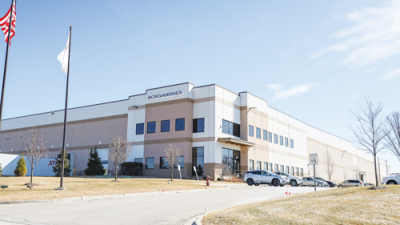METRO DETROIT — Oakland County officials are crying foul after a resolution was passed by the Macomb County Board of Commissioners, laying the blame for poor water quality reports on the neighboring jurisdiction.
The resolution was passed by the Macomb Board of Commissioners on Oct. 27. It alleges that harmful levels of E. coli in the water and an increase in the growth of lyngbya, a bacterium that can collect in high qualities on the water and stick to boats and other seafaring objects, in Lake St. Clair are caused by Oakland County’s water runoff.
County Commissioner Barbara Zinner of the Macomb County board’s District 10, representing Harrison Township and most of St. Clair Shores, introduced the resolution.
“I’ve had this on my mind for quite a while,” she said. “What pushed it for me and, I think, for the board, was a Harrison Township event this summer, and this one man (who) said he would like to talk to me. He and others said they live on the lake near Jefferson (Avenue). They have had this problem with E. coli. They have not been able to use their boats due to lyngbya and the growth just keeps matting onto their boats and the docks. They couldn’t put their boats in their boat wells for two years, and it comes back every year. It’s costly and disgusting.”
In a press release, the Oakland County Water Resource Commissioner’s Office disputed that Oakland County is to blame.
“The facts actually paint a much different picture,” wrote Trisha Bruzek, the supervisor of marketing and communications for the office. “State and federal agencies have looked at the evidence and have said there is no correlation between these discharges and Lake St. Clair’s algae problems and subsequent beach closings.”
The Oakland County Water Resource Commissioner’s Office said that E. coli issues in Lake St. Clair are not coming from Oakland County.
“While I don’t dispute that Macomb has experienced these problems, it is not true that these harms were caused by any action taken by Oakland County,” wrote Bruzek. “The U.S. Geological Survey Upper Midwest Water Science Center has performed extensive research regarding the cause of the beach closings and has concluded that waterfowl, primarily geese, are the source of the E. coli problem along the lake’s shoreline. Additionally, scientific studies from the Michigan Department of Environment, Great Lakes, and Energy’s Water Resources Division clearly indicate that there is no correlation between beach closings and the operations of Oakland County’s state-of-the-art facilities.”
Bruzek said that the Macomb County resolution “misses the mark.”
“In fact, Macomb County’s Health Department’s own studies have determined that numerous drains flowing into Lake St. Clair have extremely high levels of E. coli,” she stated. “Testing revealed that these drains are polluted with human waste from failing septic fields in Macomb County. Further, it also found two things about the foul-smelling decaying algae evident along the banks of Lake St. Clair — especially in Harrison Township. First, it presents no imminent public health hazard. Second, its presence is not indicative of raw sewage.”
Zinner responded that this statement does not address the correct issues, saying that the problem is not necessarily the level of E. coli in Oakland County’s water, but the fact that so much of its rainwater and sewage share the same flow system that deposits into Lake St. Clair. Such an enormous amount of rainwater can overfill the system.
“Rainwater does not cause the increase in E. coli, but you only have so much storage space for sewage, so when the rainwater overflows the system, it also causes the sewage to overflow, since they are using the same system,” Zinner said. “The actual E. coli could very well be coming from Macomb County, but it is the volume of rainwater from Oakland County that the system is not equipped to handle that is causing this E. coli to become a dangerous problem.”
Bruzek concluded her statement, stating the two counties need to work together on the issue.
“I find no fault with the passion of the authors of the resolution,” she wrote. “While I take exception to the veracity of some of the resolution’s claims, I’m sure the commissioners who voted for it were acting with the best interests of their constituents firmly in mind. However, a more efficient approach to Lake St. Clair’s pollution problem will be found when we work together to address this critical issue.”
Zinner agreed with the call for more intercounty communication and cooperation on the matter, saying that some in both counties are doing so already.
“We expect to work it out. I’ve already spoken to (Water Resource Commissioner) Jim Nash,” she said. “At our board, we are now trying to restore a yearly cleaning of sites on (the) Clinton River and Lake St. Clair, so we want to bring that back. The cost would be probably about $1 million, so I don’t know if it will pass because we want to be responsible stewards of taxpayer money, but we are considering that on the board. Beyond that, we just want to have more dialogue between the two counties.”
Zinner added that newer buildings and newer subdivisions are not having these problems since they have the rainwater going into separate systems. However, because so many older properties still do this, it would likely be a $3 billion cost between Oakland and Macomb counties to address this issue.
She hopes, if nothing else, the disagreement reminds the public how important issues of water quality are to the community.
“The concern is for our drinking water. When 40% of Michiganders drink this water, you need to take care of it,” Zinner said. “Some people don’t even want to go in the water now. … It affects property values and the local economy, too. We need to have a plan and form some goals. It’s about our children and our future.”
 Publication select ▼
Publication select ▼


























